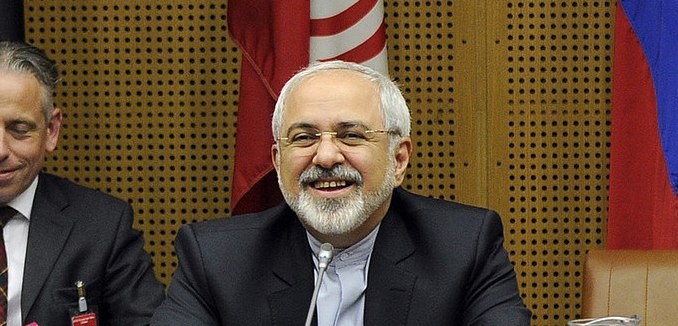A analysis for the Institute for National Security Studies published Tuesday argued that Iran’s claims of victimization are a “nuclear fairy tale,” part of a “a public campaign to persuade the media and public opinion” that it is being unfairly targeted by a “bullying hegemonic West.”
In the analysis, Shimon Stein and Emily Landau give an example of this campaign:
First is a description of the situation recounted by Iranian Foreign Minister Mohammad Javad Zarif in an onstage interview with David Ignatius of the Washington Post, during the Munich Security Conference in early February 2015. In this interview, Zarif begins by saying that the objective of the nuclear negotiations is to “make sure that Iran’s nuclear program remains exclusively peaceful.” He then explains: “That means that Iran should, in fact, be able to exercise its right to nuclear technology for peaceful purposes, because without it exercising that right, it’s impossible to make sure that it’s peaceful”. The second condition is to lift all sanctions on Iran, which, as Zarif explains later in the interview, is the objective of the JPOA, if read “correctly.”
These are two rather odd conditions for ensuring that Iran’s program is peaceful, with no mention of the need to satisfy the IAEA [International Atomic Energy Agency] probe into strong suspicions of Iran’s work on a military nuclear program. Yet Zarif’s answer is very simple: “Iran takes steps to reassure the international community that [its] program remains peaceful – and the reason I use the word ‘reassure’ is that over the last 10 years or more, Iran has been the subject of more IAEA inspections than probably any other country on the face of the Earth, and the IAEA has yet to find a single evidence that Iran’s program is anything but peaceful”.
In fact since the release in 2011 “of the full annex of IAEA suspicions about Iran’s illicit military activities in the nuclear realm, Iran has stonewalled the IAEA investigation,” not allowing IAEA inspectors to visit the Parchin complex, and missing a deadline last August to answer the IAEA’s questions about its illicit nuclear program.
The problem of the Iranian narrative is compounded by the failure of the West to counter the false Iranian claims. Stein and Landau explain:
It is dangerous to avoid confronting Iran on weaponization – the single most important violation of the NPT [Nuclear Nonproliferation Treaty], and the major justification for all that the P5+1 demand of Iran regarding dismantlement of its program. Admission of wrongdoing is of central importance for verification purposes, because in order to deal with future violations, it is important to know how a state has cheated in the past. But the P5+1 would be advised to take very seriously the power of narratives. As long as Iran is allowed to cling to its narrative unchallenged by the West, all of the P5+1 demands can be depicted as exaggerations on the part of the bullying Western nations. Undercutting the narrative would highlight the necessity of all the demands in order to stop a dangerous proliferator that seeks regional hegemony and has been lying and cheating its way to the nuclear weapons threshold.
This Iranian tactic of dismissing accusations about its illicit nuclear activities with falsehoods has been going on for some time.
In 2006, the first two United Nations Security Council resolutions penalizing Iran for violating the NPT were passed. Resolution 1696, passed on July 31, 2006, gave Iran one month to stop all of its nuclear enrichment activities. Sanctions were first imposed after the passage of Resolution 1737 at the end of December, nearly five months later.
Instead of addressing why Iran failed to meet the deadline called for in 1696, Zarif, then Iran’s ambassador to the United Nations, objected to the imposition of the sanctions and played innocent.
He said that Iran had allowed more than 2,000 “person days of IAEA scrutiny” of all of its related — and even unrelated — facilities, resulting in reported statements by the Agency on the absence of any evidence of diversion. His country had also voluntarily suspended its lawful enrichment activities for more than two years, as verified by the Agency, in order to build confidence and provide ample opportunity to find a mutually acceptable solution, if that were ever the intention of its negotiating partners. It had presented various far-reaching proposals to ensure permanent non-diversion, and it had consistently called for time-bound and unconditional negotiations to find a mutually acceptable solution, a call that had been repeated yesterday by Iran’s Foreign Minister.
[Photo: Bundesministerium für Europa, Integration und Äusseres / Flickr ]




